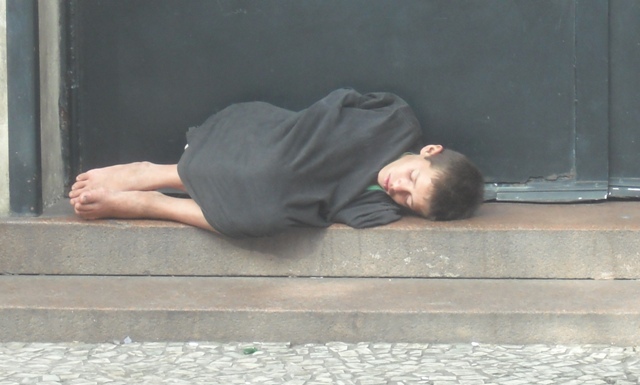Klaus Hart Brasilientexte
Aktuelle Berichte aus Brasilien – Politik, Kultur und Naturschutz
Brasilien, „Ethics and Politics.“ Befreiungstheologe Frei Betto, Sao Paulo.
Neo liberal ”ethics are reduced to the private virtues of individuals ignoring the vision of institutional ethics. They thus reinforce the paralysing attitude of morality which reduces ethics to individual illusory perfection. Now, if the society is structured, ethics are necessary for the configuration of the historical world. Therefore ethics demand a theory of normative politics from the institutions which rule society.http://www.hart-brasilientexte.de/2009/12/07/my-name-is-misery-they-have-forgotten-me-brasiliens-wichtigster-befreiungstheologe-frei-betto/
Kranke alte Frau bettelt in der City von Sao Paulo, reichste Stadt Lateinamerikas.
http://www.hart-brasilientexte.de/2009/12/07/macht-geld-korruption-nach-lulas-skandal-um-stimmen-und-parteienkaufmensalao-nebenan-bei-brasilia-gouverneur-arruda-das-gleiche-mensalao-schema/Â As Marilena ChauÃ[1] <#_ftn1> points out, talking about ethics in politics is not enough. The criticism of institutions which generate injustice and deny rights demands ethics from politics and the creation of new areas for new rights. Institutions must guarantee distributive justice to the whole of society “ sharing of the goods to which all have a right “ and to participative justice i.e. the presence of all “ democracy “ in the power which decides society™s paths.
The great ethical challenge today is how to create institutions capable of assuring universal rights. This supposes a rupture from the present post modern neo liberal vision of fragmentation of the world and self seeking individualist exacerbation. In spite of human beings having a manufacturer™s flaw, what Genesis calls ”original sin, a new socio-political institutionalism capable of assuring rights and preventing threats to freedom and to nature must be created,. This would imply creating a new culture to inhibit these threats such as occurred with incestuous relations practised in ancient Egypt and in other examples in the bible.Where are universally acceptable ethical values to be found? How to make people question themselves about criteria and values? Hans Küng suggests that a minimal ethical base must be sought in the great religious traditions. It would be a way to proceed from regional ethics to a world ethic but how to apply it in the political arena? Â What must change first, the society or the people, the egg or the chicken?It is useless to take a step backwards and accept the utopia of State control as a pre condition for the transformation of society. It is necessary, first, to transform society through the achievements of the social movements together with gestures and symbols which underline the anti popular roots of the neo liberal model and to combine the contradictions of daily practices (progressive impoverishment of the middle class, unemployment, the spread of drugs, degradation of the environment, preconceptions and discrimination) with great political strategies.To admit that power only resides in the State is to accept bourgeois logic. It spreads throughout civil society, the popular movements, NGOs and the spheres of art and culture which implant new ways of thinking, feeling and acting, modifying ideological as well as religious values and views.”We do not want to conquer the world, we want to make it new proclaim the Zapatistas. Today the struggle is no longer one class against another, but all society against a perverse model which makes the accumulation of wealth the only reason for living. The struggle is for humanisation against de-humanisation, for solidarity against alienation, for life against death.
The crisis in the left is not merely due to the fall of the Berlin Wall. It is theoretical as well as practical. It is theoretical for those who confront the challenge of socialism without Stalinism, dogmatism, deification of leaders and of political structures. It is practical for those who know that there is no way out without resuming work at the grassroots, re-inventing the union structure, reactivating the student movement and including indigenous, ethnic, sexual, feminist and ecological matters on the agenda.
In this despairing world only the left™s imagination and creativity are capable of freeing youth from inertia, the middle class from discouragement or the excluded from painful conformity. This requires an ideology which will regain socialism™s humanist ethics abandoning all scholastic interpretation of reality, particularly any attitude which, in the name of the struggle against the bourgeoisie, makes the left act mimetically bourgeois by flattering vanity, holding positions of power, withholding information about financial resources, reinforcing the cannibalism of groups and tendencies which satisfy themselves by biting one another.
There is only one centre of reference for the left, around which it must unite: the rights of the poor.
 *Frei Betto is a writer, co-author with L.F. VerÃssimo and others, of ”O Desafio Ético (The Ethical Challenge) (Garamond). Â
 [1] <#_ftnref1>  Marilena Chauà is a Brazilian philosopher.
ABOUT THE AUTOR
Â
He is a Brazilian Dominican with an international reputation as a liberation theologian.
Within Brazil he is equally famous as a writer, with over 52 books to his name. In 1985 he won Brazil™s most important literary prize, the Jabuti, and was elected Intellectual of the Year by the members of the Brazilian Writers™ Union.
Frei Betto has always been active in Brazilian social movements, and has been an adviser to the Church™s ministry to workers in Sáo Paulo™s industrial belt, to the Church base communities, and to the Landless Rural Workers™ Movement (MST).
In 2003-2004, he was Special Adviser to President Lula and Coordinator of Social Mobilisation for the Brazilian Government™s Zero Hunger programme.

Crack-Kind auf den Stufen von Sao Paulos Konzertsaal des Sinfonieorchesters OSESP. http://www.hart-brasilientexte.de/2009/09/20/crack-jugendpolitik-unter-lula-und-jose-serra-dunkelhautige-kinder-und-jugendliche-sind-crack-hauptkonsumenten/
« „My name is misery – they have forgotten me.“ Brasiliens wichtigster Befreiungstheologe Frei Betto. – Amazonenser am Rio Negro. Gesichter Brasiliens. Stimmen Lateinamerikas(SWR) – Audios zum Anklicken. Die Schlingensief-Teamfotos aus Sao Paulo. »
Keine Kommentare
Noch keine Kommentare
Die Kommentarfunktion ist zur Zeit leider deaktiviert.
NEU: Fotoserie Gesichter Brasiliens
Links zum Thema Ukraine
Fotostrecken Wasserfälle Iguacu und Karneval 2008
interessante Links
Seiten
Ressorts
- Kultur (6.975)
- Naturschutz (1.101)
- Politik (12.729)
Suchen
RSS-Feeds
Verwaltung


